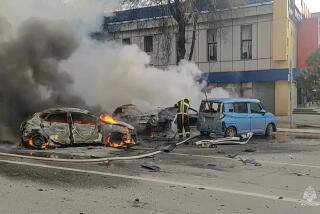Kosovo Peacekeepers Are Targets in New Wave of Violence
- Share via
PRISTINA, Yugoslavia — In the heaviest night of violence directed at NATO-led peacekeepers since they arrived in Kosovo, a Russian soldier was wounded by attackers while Americans traded gunfire with other assailants and then chased their car with an Apache helicopter gunship.
The incidents were among seven in which soldiers of the NATO-led force either came under direct fire or were in the immediate vicinity of shooting.
It wasn’t immediately clear whether the incidents late Thursday and early Friday signaled a downturn in relations between international peacekeeping troops and Kosovo residents. Ethnic Albanians, Kosovo’s majority, were overjoyed at the arrival of the peace force in June after the Western alliance’s 11-week air war to end a Serbian campaign of expulsions, looting and killing in the region. Kosovo remains a province of Serbia, Yugoslavia’s dominant republic.
Canadian Maj. Roland Lavoie, a spokesman for the peacekeepers, said the increased attacks could simply be a reflection of the force’s own increased numbers and activity. Typically, attacks against peacekeepers have been limited to a couple a night.
The peace force now totals 38,000 troops from 21 countries. “We have an increased presence, a lot more patrolling, a lot of checkpoints,” Lavoie said.
He also issued a warning: “Aggressors have to keep in mind that we have rules of engagement that allow us to use deadly force.”
Military leaders, including British Lt. Gen. Mike Jackson, NATO’s top commander in Kosovo, have repeatedly said that the security situation is improving.
Nonetheless, despite the North Atlantic Treaty Organization’s attempts to disarm Kosovo and demilitarize the rebel Kosovo Liberation Army, troops regularly encounter people with weapons. In addition to guns, hand grenades and mortars have been seized recently.
At the United Nations, Fred Eckhard, spokesman for Secretary-General Kofi Annan, said that peacekeepers had briefly detained Rexhep Selimi, the interior minister of the Kosovo Albanians’ self-styled government.
Sellimi, a ranking officer of the KLA, was seized late Wednesday while driving a car with a flashing blue light. Eckhard said that when Sellimi loaded his weapon and made a threatening gesture toward the patrol, he and his bodyguards, who also were armed, were arrested. They were released later without their weapons.
NATO officials did not say who they thought was responsible for the attacks on the peacekeepers. However, Kosovo’s remaining Serbs, victims of revenge killings by ethnic Albanians, are an increasingly small and scared minority.
Kosovo is filled with angry and desperate ethnic Albanians who have returned to homes destroyed during the Serbs’ campaign of expulsions.
The overnight shooting of the Russian soldier at a checkpoint in Koretin in eastern Kosovo could be the product of ethnic Albanians’ unhappiness with their presence in Kosovo.
Most Albanians view the Russians as allies of the Serbs, and many allege that Russian mercenaries fought with the Serbs.
In Kosovska Kamenica, near Koretin, about 3,000 ethnic Albanians demonstrated later Friday against the presence of Russian soldiers. Protesters carried placards saying “Criminals can’t be peacekeepers” and “Russians out of Kosovo.”
The Russian soldier was shot in the thigh and taken to a U.S. military hospital. Peacekeepers returned fire, but the attackers escaped. Lavoie said the wounded soldier was expected to make a complete recovery.
In Urosevac, south of the provincial capital, Pristina, U.S. soldiers guarding a house occupied by Serbs were shot at by several assailants. The peacekeepers were not injured, and they returned fire.
Officials of the peacekeeping force, known as KFOR, said the attackers fled in a station wagon and that an Apache helicopter gunship chased them as the car sped north toward Pristina, about 20 miles away.
KFOR officials said the car was joined by a white Mercedes-Benz during the chase. British soldiers found the station wagon at a Pristina hospital and arrested a severely wounded man, they said. A search is underway for the Mercedes-Benz and the other suspects.
In other shooting incidents, peacekeepers detained 10 people and seized guns, grenades, an artillery shell and an antitank rocket.
Lavoie declined to discuss other details of the incidents and said he didn’t know what the motives were for the attacks.
“Our presence obviously disturbs some of these people,” he said.
At the United Nations, Eckhard said that international police monitors will be deployed in Kosovo starting this weekend. The first officers will be in police stations and mobile units in Pristina.
So far, 474 of an expected 3,100 police officers are ready for duty. The international police also will train local recruits at the Pristina police academy, which is expected to open at the end of the month.
In a positive development for relief workers, Eckhard said the Macedonian government had lifted customs inspection fees for humanitarian supplies. U.N. convoys, which had been suspended, resumed after the decision.
More to Read
Sign up for Essential California
The most important California stories and recommendations in your inbox every morning.
You may occasionally receive promotional content from the Los Angeles Times.














